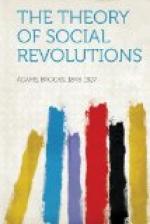[3] See the decisions of the Commerce Court on the Long and Short-Haul Clause. Atchison, T.&S.F. By. v. United States, 191 Federal Rep. 856.
[4] Darcy v. Allein, 11 Rep. 84.
[5] 68 Pa. 173.
CHAPTER II
THE LIMITATIONS OF THE JUDICIAL FUNCTION
Taking the human race collectively, its ideal of a court of justice has been the omniscient and inexorable judgment seat of God. Individually, on the contrary, they have dearly loved favor. Hence the doctrine of the Intercession of the Saints, which many devout persons have sincerely believed could be bought by them for money. The whole development of civilization may be followed in the oscillation of any given society between these two extremes, the many always striving to so restrain the judiciary that it shall be unable to work the will of the favored few. On the whole, success in attaining to ideal justice has not been quite commensurate with the time and effort devoted to solving the problem, but, until our constitutional experiment was tried in America, I think it had been pretty generally admitted that the first prerequisite to success was that judges should be removed from political influences. For the main difficulty has been that every dominant class, as it has arisen, has done its best to use the machinery of justice for its own benefit.
No argument ever has convinced like a parable, and a very famous story in the Bible will illustrate the great truth, which is the first lesson that a primitive people learns, that unless the judge can be separated from the sovereign, and be strictly limited in the performance of his functions by a recognized code of procedure, the public, as against the dominant class, has, in substance, no civil rights. The kings of Israel were judges of last resort. Solomon earned his reputation for wisdom in the cause in which two mothers claimed the same child. They were indeed both judge and jury. Also they were prosecuting officers. Also they were sheriffs. In fine they exercised unlimited judicial power, save in so far as they were checked by the divine interference usually signified through some prophet.
Now David was, admittedly, one of the best sovereigns and judges who ever held office in Jerusalem, and, in the days of David, Nathan was the leading prophet of the dominant political party. “And it came to pass in an eveningtide, that David arose from off his bed, and walked upon the roof of the king’s house: and from the roof he saw a woman washing herself; and the woman was very beautiful to look upon. And David sent and enquired after the woman. And one said, Is not this Bath-sheba, the daughter of Eliam, the wife of Uriah the Hittite? And David sent messengers, and took her; and she came in unto him, and he lay with her; ... and she returned unto her house.”
Uriah was serving in the army under Joab. David sent for Uriah, and told him to go home to his wife, but Uriah refused. Then David wrote a letter to Joab and dismissed Uriah, ordering him to give the letter to Joab. And David “wrote in the letter, saying, Set ye Uriah in the forefront of the hottest battle, and retire ye from him, that he may be smitten and die....




